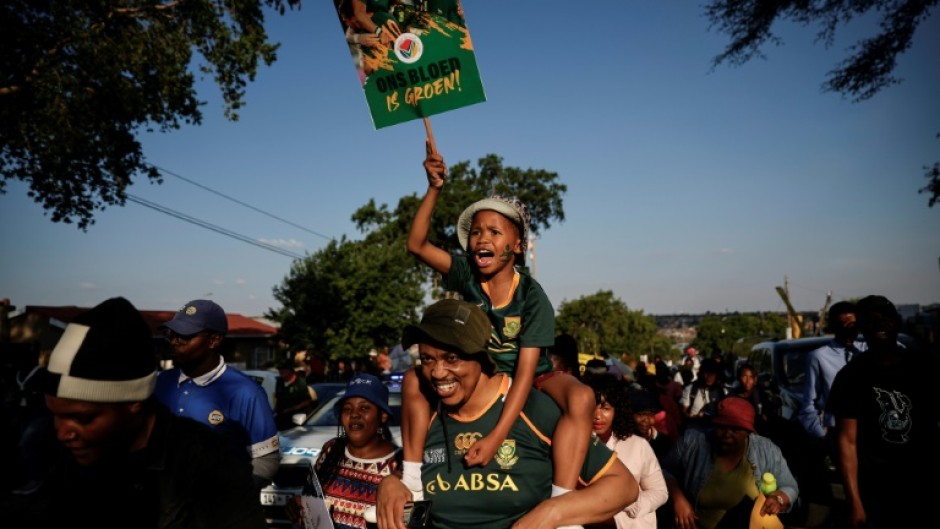JOHANNESBURG - Thousands of people gave the World Cup-winning Springboks a roaring welcome in Soweto on Thursday.
South Africa edged arch-rivals New Zealand 12-11 to achieve a record fourth Rugby World Cup title and their second in a row in a gripping final last Saturday in Paris.
In Soweto, teenagers danced in their school uniforms, as others, young and old, waved South African flags and yellow signs reading "thank you Bokke (Springboks)", waiting for the yellow and green open-top bus carrying the players.
Wearing a green and gold t-shirt, Dined Malise, 49, left home a couple hours before the team's scheduled arrival to get a prime spot along the route.
"I'm so proud about my Bokke (Springboks), especially my captain," she said before breaking into a "Viva Bokke, Viva!" cry of joy.
Supporters erupted in a loud cheer as the players, wearing yellow t-shirts emblazoned with the team's motto "Stronger Together", rode through one Soweto's main streets, with captain Siya Kolisi rallying the crowd from the front, holding the Webb Ellis Cup.
- 'Into legend' -
The team began its victory tour earlier in the day in Pretoria, where the country's President Cyril Ramaphosa hailed the players for uniting a country with a divisive past.
"Saturday night, you strode off the pitch of victory and passed into legend," said Ramaphosa, who this week declared a public holiday on December 15 to celebrate the win.
"In doing so you have lifted the spirits of an entire nation and filled us with pride."
For 90 years, Springbok selectors chose only white players, with black and mixed-race athletes sequestered in separate leagues.
That started to change after the advent of democracy in 1994, with Nelson Mandela famously rallying behind the team that won its first World Cup in 1995.
"This is the one time where everybody forgets whether they are black or white," said Vincent Mokgako, 65, sitting just outside the house where Mandela used to live in Soweto, now a museum.
When locals were "still oppressed", the Springboks would have received a "hostile" reception in what used to be a hotbed of anti-apartheid activism, said the social worker, who was "born and bred" in the township.
"This is this is a legacy that Mandela left, that sports always brings people together," he said.
- 'Diversity is our strength' -
In recent years, Kolisi, 32, has been pivotal in bringing many young, black South Africans closer to the sport.
"We are very diverse, just like you are outside there and we just wanted to show that diversity is our strength," Kolisi, the Springboks' first black Test captain, said earlier dedicating the trophy to "the people of South Africa".
The Springboks, who also passed through Soweto after their 2019 win, "were not a thing here," said local resident Lindiwe Mkhize, 43.
Home of two of South Africa's biggest football clubs -- Kaizer Chiefs and Orlando Pirates — Soweto has long been the domain of the round ball.
But rugby "is getting more popular by the day," said Mkhize, a teacher, adding she hoped the team's visit would be followed by investments in rugby infrastructure to help local children chase their dreams and erase the perception that "rugby is not for us as black people".
The latest success brought joy to a nation that is still described by the World Bank as the most unequal in the world and battling unemployment, crime and electricity and water problems .
"We are not happy but the Boks make us forget for a while that... There is still a lot of people who are under poverty, who are starving around here," said Mokgako.
The Springboks will go to Cape Town on Friday, Durban on Saturday and East London on Sunday.
"The performance of the Springboks...has reminded us that even amidst our many challenges, there is always room for optimism and hope," said Ramaphosa.

